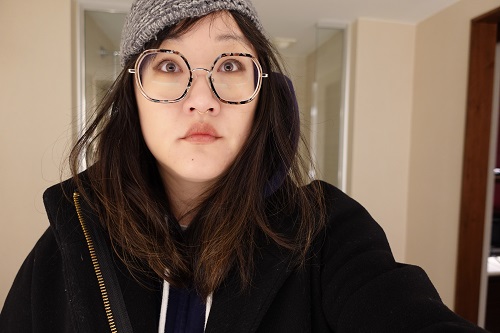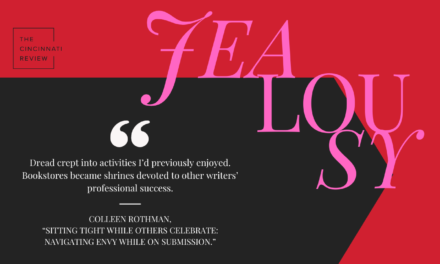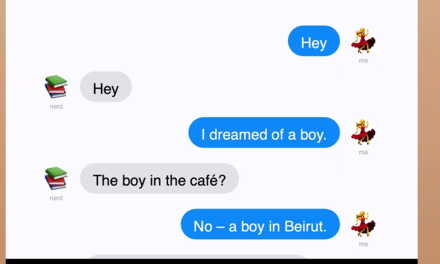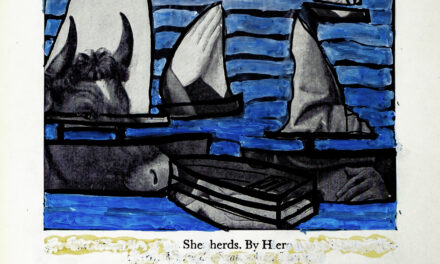
Managing Editor Lisa Ampleman: I was blown away by Ginger Ko’s reading in November 2021 as part of the University of Cincinnati English Department’s Visiting Writers Series. Ko read from POWER ON, which is a printed book but also an app that allows for interactive possibilities with text and image. She exploded my sense of what a text can do and in what places it can live. So I was glad to see her name in our literary nonfiction submissions—and then blown away all over again by her enactment of redaction in this essay about familial abuse. Ko balances not saying exactly what happened to her with the knowledge that doing so affects both the abuser and herself, in different ways. She complicates what it can mean to say “Me too.” We’re glad to present Ko’s essay here as a special feature.
A content warning: this essay mentions abuse and suicide.
Due Water
GINGER: Why have you been so cruel to me?
[REDACTED]: [redacted]
GINGER: But you were. Yes, you were. You were. You used to say [redacted] when I [redacted]. You [redacted] me.
[REDACTED]: [redacted]
* * *
I have a traumatizer in my life. But I cannot name them, neither by their given legal names and aliases nor by their specific relation to me. I have chosen to keep them in my life because they are in my family of origin (a common traumatizer, that traumatizer of origin) and they provide me with privileges that I have decided to accept—for now, though I did not for much of my life—and I am now relatively safe from them. Writing publicly about them would endanger me. The identity of my traumatizer will be obvious to most, except to the traumatizer themself, who is able to avoid their complicity and accountability unless faced with their naming and recognizable traits. I have confronted my traumatizer a few times, and it did not go well for me. I was punished, and the traumatizer eventually returned to their old roles. They always return to the roles they have carved for themself with their own traumas.
That’s fine for me, I think. I no longer have any interest in changing them. I’ve accepted that I can’t.
I’ve been thinking about the matter of naming people publicly ever since I posted on Facebook, many years ago, about feeling terrible after a busy weekend. What was left unwritten was that the weekend was busy because a relative (yet another traumatizer branched from the root of origin) had invited themselves over to my house and behaved horribly. My Facebook post’s purpose was recognizable for most in my friends list, who weren’t privy to all the trivial details of my life: I wanted some friends to react to my post with well wishes and little digital signs of support after a particularly draining time.
But my family knew that my terrible feelings also coincided with this particular relative’s visit, and they saw the vast dark waters of context, making the connection. I was immediately called up for embarrassing the family, for airing dirty laundry by saying “publicly” that I had felt bad after the weekend. They knew that I meant that the relative had made me feel bad, and it was bad of me to say so. It’s funny when I imagine that perhaps everyone else on my friends list guessed my post was about something like a hangover, or catching a cold, or suffering from a bout of food poisoning. Perhaps.
My admonishing family offered up what they considered a more respectable option: Next time, bring up your problems to the relative and to us (the people invested in false narratives). To the space that had already been seized by age-old power dynamics that cast me as a silent sufferer, and to mediators who have always decided against me. Yes, next time I should return to the space that has always kept me quiet. The space that has always explained to me that I am wrong for naming my feelings.
Naming wrongdoers in print is seen as acting like a vengeful whistleblower, a disloyal exaggerator, a snitch. I suppose that’s why it happens willingly only when the named has done something undeniably egregious, can be described as a monster, and the story can be consumed in a ravishing way by the reading public. I want to tell my story, but I also want to live my story too. Pick one or the other, respectability politics says. Otherwise, shut your mouth.
* * *
Otherwise, shut your mouth. Why do we have this cultural injunction? Someone must have decided, long ago, that there’s a risk of exposure by being a part of a storyteller’s life, especially if the part that one contributes is harm. So let’s all just keep our mouths shut, until the people in the stories are incontestably good or thrillingly bad. Heroes or villains—or else shut up.
* * *
That I’m refraining from naming my own traumatizer is doing to myself what my relatives admonished me to do: I am preserving my current relationship with the traumatizer, I am redacting the facts—voice, actions—of the traumatizer to preserve my own sense of safety and ease. The traumatizer is unrecognizable to others who have their own relationship with this person. This essay’s experiment points out to me what my silencers and rebukers are saying to me when they say “Don’t speak their name” or “You were wrong to speak their name.”
* * *
GINGER: You liked it when I felt bad. When you thought I was too uplifted or too confident, you slashed at me. When I was visibly upset, you didn’t like that either. You [redacted] when I cried.
[REDACTED]: [redacted]
GINGER:—and it was not enough.
* * *
I tried to conceive without understanding what it would mean to my body. When my at-home pregnancy tests were consistently positive, I went in for an ultrasound to make sure, to have outside confirmation of what was happening inside me. The ultrasound tech did not use overhead lights in the room, and built up on the walls was an intricate mosaic of disparate screens. In the center of this glowing command station presided the reclining bed for the examined womb. And connecting the machine to womb were the probes, one of them the dreaded long wand for transvaginal ultrasounds.
Friends who are parents had warned me that children are born with their personalities, that the child as an individual will be difficult to anticipate or change. When the tech dug around painfully with the wand and finally located something, an image appeared in one of the screens to my right. Some of the grayish blur condensed around a dot brighter than the rest—the embryo. The machine quickly spat out a glossy receipt of images—the sonograms.
“About the size of a grain of rice,” the tech announced cheerily. She activated another one of the screens, and the embryo’s ECG began to spike across it. Each spike coincided with a cavernous recording of the beats that sounded as blurry as the embryo’s sonogram. “A great heartbeat, nice and strong.”
That was when I began to weep squeakily. I was not moved by my pregnancy so much as by the sounds and images of something within me asserting itself with steady, tenacious bursts of electricity. I had been disconnected from my body in so many ways, and here was visual proof that once again my body was carrying on without me thinking about it at all, a creature persisting with its functions, and most times utterly on its own.
When my child was born, I found that the adage from my friends was entirely true. This being was someone I loved as a bodily, necessary condition, but this child was also a stranger I often looked upon with utter unknowing. Who are you? What are you thinking? Deciding on a name for this infant seemed presumptuous and premature. Are you going to hate your name as much as I hated mine? As another instance when your parents forced something on you that you didn’t want? I studied this child with care and not a small amount of anxiety, trying to learn and discern the needs of this child, many times not understanding until it was too late. I felt unprepared for the project of understanding a person whose care and safety and happiness depended on my competence and willingness.
These days I practice a lot of listening to my kid. I try very hard not to react or direct her feelings and narratives; I give neutral listening responses when she conversationally signals that a neutral interjection is called for. I am learning to shut up. I am learning to redact myself from my daughter’s decisions about her feelings and experiences. I listen and try my best to learn, especially since various stuffed animals and guinea pigs get renamed on a weekly basis. My daughter stringently expects a change in usage when “Sweet Potato” becomes “Bagel,” when the rodent formerly known as “Strawberry” is now “Rice Ball Potato Yum.” She has not yet announced her own name change, but I anticipate and prepare for its eventuality.
As a child I was always looking for meanings and signals. I was often alone, examining fairy tales for alternatives or else playing little games while waiting for the next thing to show itself. The stories told in fairy tales never had pauses or silences, never the routines of emptiness, and in fact they jumped forward in time so seamlessly that it seemed the story-worlds were streams of unceasing action. During the late afternoons, when each day seemed very old, I liked to devise little games for myself in my room. I once collected apricot pits and painted them orange and blue, and before I knew what tarot cards were, I drew my own system of divining on folded pieces of paper, using them to practice children’s matching and sorting games. Each game was based half on chance and half on skill, and chance took full precedence in my mind.
I won this round, so luck wanted to show itself to me.
I lost this round, so luck was away, attending to something else.
Eventually my mind wandered to other things while I went through the little puzzles again and again. I won three times in a row. Something is intervening.
When I played with the other kids in the apartment-complex swimming pool, we hid in the water, testing our lungs, and dared each other into risky dives. I became more childlike when I was around other children, relying on my own strength to win and accepting another’s strength when I lost. But when I was alone with my family of adults, I couldn’t resist returning to superstition. The fairy tales that I liked best were the ones that transformed downtrodden and plain protagonists into powerful, magic beings. I noticed that the antagonists in these scenarios were often power-stealers, crafty creatures who gained control through enthralling spells that leeched energy from other sources.
The protagonists had an innate, untapped power that only needed to show itself, to be discovered. I wanted so much to have something wholly formed within me, something waiting to be unleashed. I wanted to be powerful, I wanted the ability to manipulate the world around me, I wanted my existing distinctions to be explained by something impressive. I wanted my undesirability as a girl, as a daughter, as a Chinese American kid to turn out to be indicators of strong, admirable magic rather than the traits of detestable difference that they were in my everyday life. The body wishes to survive and can persist for long periods despite poor care and suffering. Sometimes the mind needs words and signs—names—to understand what it is capable of.
* * *
When I was twenty-eight, newly divorced, I got a nose-jewel on the left side. One of my friends is an Indian American Ayurvedic practitioner and assured me that the left-side piercing would converse with my womb, especially during childbirth. Hungry for a child, I did not notice that my friend did not mention whether the left-side nose-jewel would aid in the actual conception or pregnancy. A few months after getting the piercing, I called my dad on Skype while my grandparents were visiting his home.
My dad was the first to spot the nose-jewel, a glittering diamond stud I had hoped would not be revealed within the pixelated contortions of Skype. My grandmother barged in front of my dad to peer into the iPad.
“Yili!” A stern forehead rose up, filling the screen. Behind her, I could see my grandfather’s gently amused face. Yili is the name my grandparents gave me, and it is the sound they use to call me to those who have come before and to those who will come after. “Why would you do that? To the nose that your ancestors gave you?” An unanswerable question.
* * *
GINGER: Whenever you raged at me, asked me why I couldn’t be a better [redacted], I took you to be asking, Why can’t you love me more? Loving you meant being more of what you wanted me to be. Can I ask you, now, what you wanted me to be?
[REDACTED]: [redacted]
GINGER: You were the one who gave me the idea that if I wanted someone to continue loving me, I had to continue training them to love me, to never, ever give them the time to stop loving me. You were the one who made love a disturbing preoccupation.
* * *
I have two dreams.
One dream is the most recurring; in it, I must navigate a house that squeezes me with its narrow corridors, forcing me to contort through suffocating tunnels, and in each of these houses, my tedious, comprehensive traversal of them (these dreams always feel like they last forever) is “learning” them—getting myself used to the ways I must fling and crawl through this maze for as long as I am to reside in this house. My movements are waterlogged and repetitive, I am always in motion lest I be sunk and swallowed.
The other dream is hypnagogic. I am always on the verge of disaster—driving along a rocky cliff, running away from danger, stumbling after someone whose company will ensure my safety—and I struggle to keep my eyes open. It is a physical fight to peer through eyelids that will not remain open, and often I use my fingers to force them apart. I cannot keep myself from losing sight, a betrayal of my control. I am always distressed by these dreams, of course, but also confused because my body has always been my helper. I have depended on its strength, its sheer force and genius for staying alive. I have a memory, I’m not sure whether of a dream or waking. I am young and small, and I have fallen into a shallow but quick stream. My body is completely submerged except for the oval of my face. Above me, my mother is shouting. I wrench my eyes open and there is an everyday afternoon around me.
* * *
I have never been afraid of the idea of my dying, and even as I discovered this about myself at a very young age, I knew this was unusual. I read books and watched shows and movies where kids and grownups broke down at the idea of death, were tormented by it. But I often thought about my idea of death—as a sudden entrance into nothingness—as a welcome relief.
I was not unafraid of injury or pain or harm from others, but I was unafraid of the idea of nonbeing. I had no life drive, and I never have, not until recently when I realized that suddenly I wanted to live in my body and provide it with pleasure and power. I think by now I am too used to the idea of not fearing death, so I haven’t yet developed that capability, the ability to fear my demise, but perhaps someday I will.
* * *
I wrote the previous section because it is unpleasant to write “I wanted to die from a very young age.” There is no delight in naming suicide as a dominant theme from my childhood. I am not sure if the naming centers the unpleasantness on myself or on the relational people in my life—my willingness to expose myself makes me the stained panties hanging on the laundry line of those close to me. Any passerby could see me and think something about the people related to those panties, without even knowing anything about them, other than that they have stained panties hanging out to dry for anyone to see. How embarrassing.
How embarrassing, truly!
* * *
Naming something, referring to it specifically, puts the object or subject into focus. This zoomed-in perspective often becomes a lurid, fetishizing gaze. Think of the photos of medical anomalies in which surgical napkins form a blocking border, isolating and framing the cyst, wart, cancer, injury. Think of the headless pornographic content. Think of the stamens centered in the close-ups of flowers. Think of the court cameras pointed at the face of the defendant. Or even worse, the witness who is cordoned on the stand, as if in a cage upraised from the predators below.
Those who experience severe bullying will recount that when they meet their tormentor, years later, the bully describes a revised history of their shared past. Especially egregiously, some bullies remember themselves and their victim as good childhood friends. A friend of mine who was molested and assaulted by a fellow student at school twenty years ago recently received a Facebook friend-request from this childhood abuser. When confronted over private messages, the abuser denied everything, remembered things quite differently indeed, and of course did not apologize for actions that they didn’t think they’d taken. We return the gaze to a shared experience and sometimes find that for the other person, there is nothing in the frame.
As in the experience of bullying and abuse, there are at least two actors in creative acts made for the public (or, possibly, for posterity). There is the creator and then there are those who will witness the art object or experience. No matter the medium, there is the shared time of the audience with the art. What the witness makes of the artistic action cannot be foreordained, not really, no matter how many structures or training have been put in place. Sometimes I think that factor can make the process of art-making so miserable for us creatives. Sometimes I think that’s why I splash around so audaciously in the abject—it’s better to have agreed upon the setting ahead of time. That is, the setting of bad feelings.
* * *
GINGER: I have bad feelings about us, about you in relation to me.
[REDACTED]: [redacted]
* * *
I live in concurrent timelines with my unnamed traumatizer. There is the self that has suffered immensely, and that hurt created the eyes, ears, and heart that see the world and its people. There is also the self that carries on calmly, maybe sometimes laughing in joy and affirmation at shared moments with my traumatizer. I used to think that only the timeline that fully recognized and strived for redress for my hurts was the timeline with integrity. Now that I have lived in many different and simultaneous timelines with many different people, I see that in a world that doesn’t make sense, it is hard to make sense of integrity.
* * *
[REDACTED]: [redacted]
GINGER: By redacting you, I get to have the last word.
* * *
I bring another party in front of my witnesses (that is, my audience, my readers), mostly without explicit permission. The witnesses know someone by name or the name of a relation, and they know this other party through me. I cannot write only about the situations in which I am completely alone. I must sometimes provide the context of other people.
From the traumatized perspective, it feels powerful to give some things a name. Finally, after all the self-doubt, the shame, the desperation or resignation, there is a name: trauma, disrespect, gaslighting, abuse, wrong, not okay. Naming verifies, calls up for others a meaning that they will also understand. (And believe. Believe?) I didn’t conjure my traumatizer out of thin air, they’re not make-believe, I didn’t choose for them to do what they did. I call it by its name and affirm that it is as real as I am.
When we say a person’s name, we are inflecting the idea of that person. Relations and motivations are different, and we must also negotiate with networks of power and alliance. That adage of never stepping in the same river twice has always appealed to me. In my mind I imagine it a bit differently, as the large glass jar I used when I was ten to scoop water out of a pond. I was collecting water to put under a microscope, and I kept scooping and dumping, scooping and dumping, wanting the perfect jar of water. I felt a thrill at the idea that I would never scoop the same jar of water twice. The fluidity, the messy composite: it provided infinite variations.
Redaction in classified documents is sometimes referred to as sanitization. I think I’ve reached a point in the essay where I must come down one way or another about naming others; I must stop sanitizing my thesis with lyrical asides. In most of this essay, I have resisted naming or specifying details. I have said that redaction of my traumatizer’s identity and words has given me the last word, but in my body, the redaction is the traumatizer’s lasting impact, the contortions or petrification of my soul and outlook, another kind of last word. If I let it. Because my continued survival and persistent work toward flourishing, that is also a word.
* * *
It is my right to name a harm and release the names of persons associated with that harm. A name is sacred, yes, but is it so untouchable that I can’t form my own ideas about that name, recall my own experiences with that name? The more power and influence a person wields, the more others rely on the person to be someone with fixed characteristics and a consistent history. We all hold our repurposed jam jars and think that what we keep is a representative sample, and I don’t like that we rebuke those who come up with something different. Perhaps a scoop of tadpoles. Perhaps a toxic algal bloom. Once again I’m sanitizing with some scummy pond water, but I think that we each own our own glass jars. To deny that we do, to silence us, to put someone’s reputation (or career, or marriage, or whatever it is that’s trotted out as corollary for that idée fixe of a person, usually a cis straight man) ahead of us is to deny an ownership that is rightfully ours. In this case, it’s the jar as metaphor for our experience of a person. Our knowledge. Sometimes it is unbearable that jars of ourselves exist out there, but if the owners of these jars didn’t achieve ownership through theft or violation, then we must live with the fact of these jars that others keep. That they can dump back into the pond at any time, and many choose to do this. My redaction of my traumatizer’s knowability is a kind of catch and release. It is a protection that allows the traumatizer to erase the consequences of their actions. It is in my favor to do so, to be so. But will it always be in my favor? And what do I do then, if protecting my traumatizer no longer serves me? I hold the jar and I decide. My name for this is due.
Ginger Ko is the author of Motherlover (Bloof Books, 2016) and Inherit (Sidebrow, 2017), as well as several chapbooks. Her latest project is POWER ON, a book as interactive app, produced by The Operating System. Her poetry and essays can be found in The Atlantic, American Poetry Review, The Offing, VIDA Review, and elsewhere.










